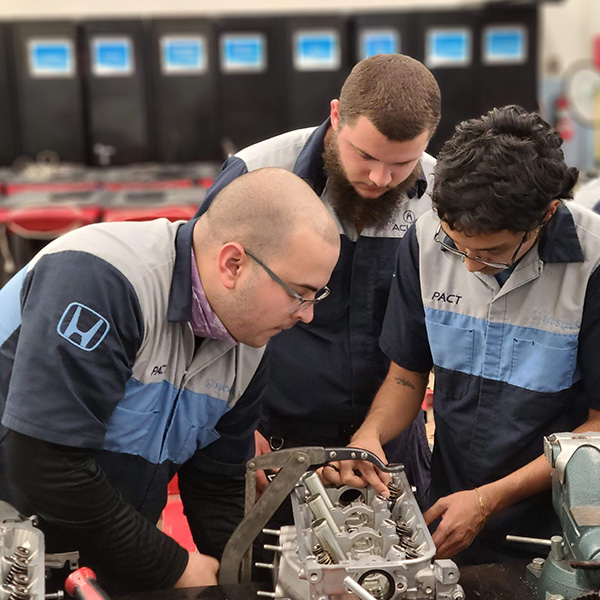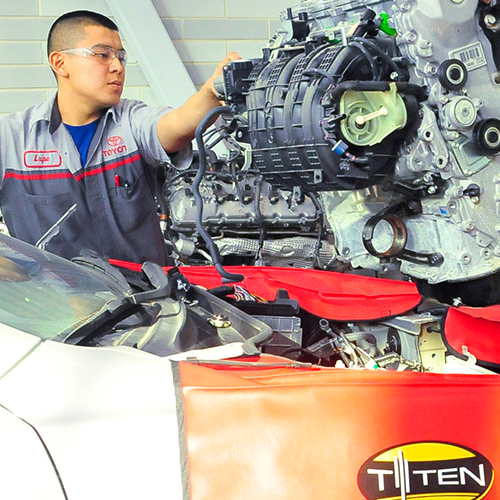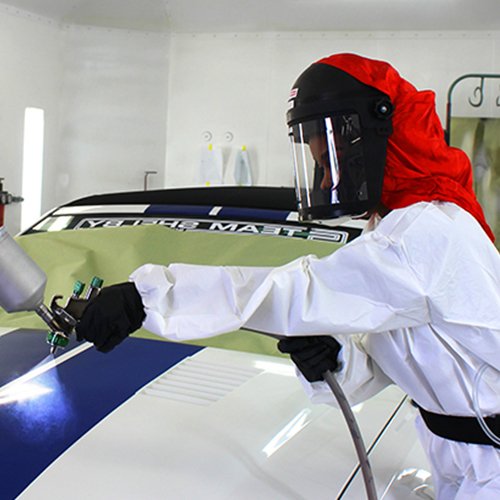Automotive Collision Technology Technician

Program Objective
The purpose of the Automotive Collision Technology Technician Program is to prepare students for employment in the Automotive Collision Repair Industry. This program is flexible enough for teaching basic job preparatory skills, enhancing existing trade skills, and specialty training.
Program Content
Specialized classroom and shop/lab experiences will enable the student to become proficient in various phases of the repair of damaged vehicles, including unibody and frame alignment. Instruction includes basic and advanced body repair, preparation and refinishing, damage analysis and estimating, repair of aluminum and plastic components, metal straightening, welding and cutting, use of automotive filler materials, repair, replacement and alignment of body panels, use of parts and
repair manuals, price lists and databases, record keeping, shop safety and housekeeping, care of hand tools, specialized tools and equipment, use of current industry standards, practices and techniques, and paint-mixing. Supplemental training is also available for persons previously or currently employed in these occupations
Admission Requirements
- 16 years of age or older and not currently enrolled in any K-12 program
- Occupational Interest
- Create update profile information on Focus
- Meet with Counselor
- No specific requirement for Information Technology
Program Hours
- Monday – Friday from 8:00 a.m. to 2:00 p.m.
Completion Requirements
The entire program is 1400 clock hours, but student can earn a certificate at the completion of the following OCPs:
OCP A – Automotive Collision Repair and Refinishing Helper Assistant: 150 hours
OCP B – Auto Collision Refinishing Technician: 450 hours
OCP C – Non-Structural Damage Repair Technician: 300 hours
OCP D – Damage Analysis and Estimating: 75 hours
OCP E – Automotive Collision Welding, Cutting and Joining: 75 hours
OPC F – Structural Damage Repair Technician: 350 hours
Students are expected to complete program competencies.
Minimum basic-skills grade levels required for awarding a Full Program Completion Certificate are 9th grade in Math, Reading, and Language on the TABE® test, or Industry Certification. Additional information can be provided by student services.
Employment Opportunities
Collision repair technicians can work for automotive dealerships and independent repair facilities. They also find career opportunities in the marine, street rod, and custom car industry; in educational institutions; in manufacturing industries; and in the retail trade.
Employment Requirement
Automotive Body Repair Technicians complete a program at a Post-Secondary institution. Industry certification is usually required once person
is employed.
Salary
The average wage for this career in Florida is $23.99 hourly or $49,890 annually.
Program Cost
- In-state residents – $2.56 per hour (Subject to change)
- Out of state resident – $10.25 per hour (subject to change)
- $15.00 application fee per trimester
- Material fee – Varies by program
- Identification fee – $5.00 per trimester
- Liability insurance fee – Varies by program
- Students must purchase books/kits and or uniforms, if applicable.
Financial AID
Financial aid is available to those who qualify. Applicants must have a high school diploma from an accredited High School, or its equivalent. To apply, complete the Free Application for Federal Student Aid, at www.fafsa.gov. Questions pertaining to this matter should be directed to the Financial Aid Office.
RMEC & TC adheres to a policy of non-discrimination and strives to provide equal opportunity to all potential students.
Transportation




